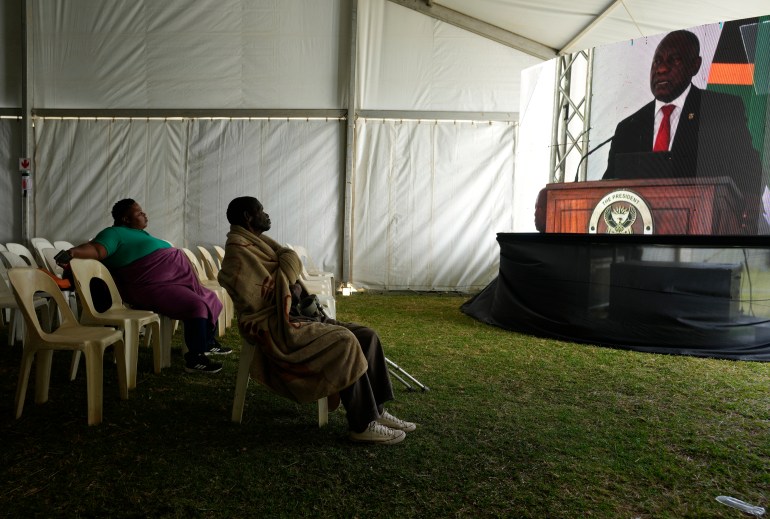President Cyril Ramaphosa hailed South Africa’s achievements under his party’s leadership as the country celebrated 30 years of democracy since the end of apartheid.
April 27th is the day “we throw off our shackles. The bells of freedom have rung in our great country,” Ramaphosa, 71, said on Saturday, reminding South Africans of the first democratic election in 1994, which ended white minority rule.
“South Africa’s democracy is young. What we have achieved in these short 30 years is something we should all be proud of. This is an infinitely better place than it was 30 years ago,” he said in a speech marking “Freedom Day” at the Union Buildings, the seat of government, in Pretoria.
The first inclusive election saw the previously banned African National Congress (ANC) party win in a landslide and saw its leader, Nelson Mandela, become the country’s first black president, four years after he was released from prison. prison.
With the ANC’s landslide victory, a new constitution was drafted, which became South Africa’s highest law, guaranteeing equality for all, regardless of race, religion or sexuality.
The ANC has been in government since 1994 and is still recognized for its role in liberating South Africans, but for some, it is no longer celebrated in the same way as poverty and economic inequality remain rife.
ANC struggling in polls
Ramaphosa took the opportunity to list improvements led by the ANC, which is in difficulties in the elections scheduled for May 29 and risks losing its absolute parliamentary majority for the first time.
“We pursued agrarian reform, distributing millions of hectares of land to those who were forcibly expropriated,” he said.
“We build houses, clinics, hospitals, roads and build bridges, dams and many other facilities. We brought electricity, water and sanitation to millions of South African homes.”
Al Jazeera’s Jonah Hull, reporting from the capital Pretoria, said that while there is freedom of expression, many South Africans will say there is no economic freedom.
“The country has an unemployment rate of 32 percent. The World Bank describes this society as the most unequal on the planet,” said Hull.
“Corruption is rife. Infrastructure is in a terrible state and, in an election scheduled for next month, polls predict that, for the first time, the ANC could fall below 50 percent of the vote. That, if it happens, would in itself be a pretty significant milestone in this country.”

An Ipsos poll released on Friday showed that support for the governing party, which won more than 57 percent of the vote in the last national election in 2019, had fallen to just over 40 percent.
If it got less than 50 percent, the ANC would be forced to find coalition partners to stay in power.
The party’s image has been seriously damaged by accusations of corruption and its inability to effectively combat poverty, crime, inequality and unemployment, which remain surprisingly high.
The ruling party is being largely blamed for the lack of progress in improving the lives of so many South Africans.
Thandeka Mvakali, 28, from Johannesburg’s Alexandra township, said life is no different to her parents’ times during apartheid.
“It’s almost the same thing. You can see, we are living in one room, maybe we have 10 in the house, for my family, we have 10 and then maybe two are employed, like my mother [and] my brother,” Mvakali told Al Jazeera.
“We are all not employed, we go to school, but there are no jobs in South Africa.”
Mvakali added that he will vote for the first time in the May 29 elections because he “hopes” his vote will count this time.
Ramaphosa acknowledged the problems but denounced critics as people who willingly “turned a blind eye”.
“We have made a lot of progress and we are determined to do much more,” he said.
This story originally appeared on Aljazeera.com read the full story






































